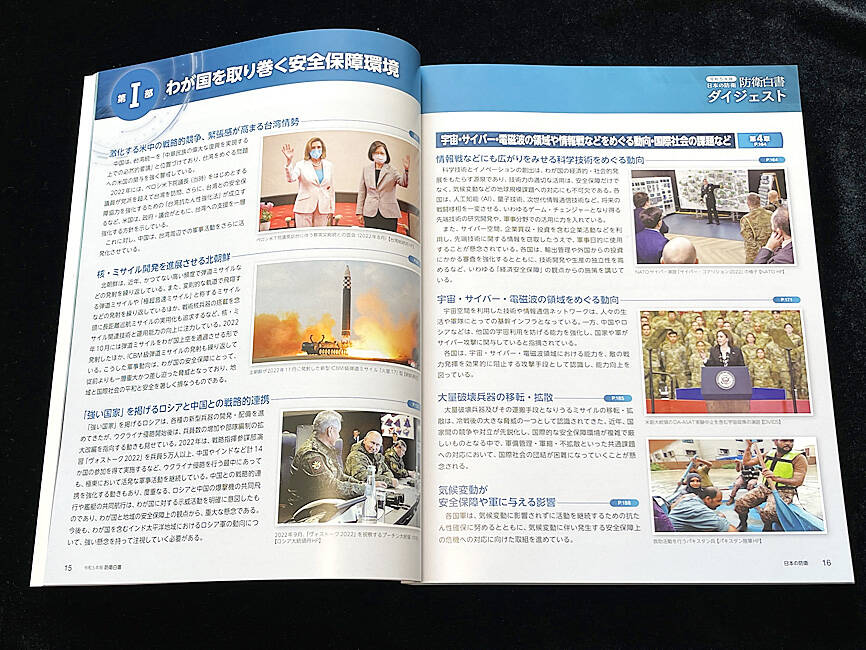Stressing the importance of peace and stability in the Taiwan Strait, Japan yesterday described China as the greatest strategic challenge to the nation and the world.
Japan is facing the most severe and complex security environment since the end of World War II, the latest Defense of Japan white paper said, citing military threats posed by Russia, North Korea and China as major sources.
The white paper, which was approved in a Cabinet meeting and released yesterday, was based on the National Security Strategy, the National Defense Strategy and the Defense Buildup Program that were adopted by the Japanese government in December last year.

Photo: CNA
Japan should cooperate with its allies in deterring and responding to unilateral changes to the “status quo” by force, as well as shaping a secure environment that does not tolerate such attempts, it said.
China has not ruled out uniting with Taiwan by force and has intensified military actions around Taiwan, it said.
Beijing’s behavior was partly in response to the US’ involvement in issues concerning Taiwan, such as then-US House of Representatives speaker Nancy Pelosi’s visit to the nation last year and the US Congress’ passage of the Taiwan Enhanced Resilience Act and other legislation in support of Taipei, the report said.
Comparing the military capabilities of China and Taiwan, including defense budget, army, navy and air force, and military equipment, it said that “the military balance of China and Taiwan as a whole is rapidly tilting in a direction favorable to China,” the report said.
Japan strongly urged China to refrain from attempting to unilaterally change the “status quo” in the East and South China seas, it said, adding that peace and stability in the Taiwan Strait are extremely important not only for Tokyo, but also for the international community.
In other developments, Japan reiterated its support for Taiwan’s inclusion in the Comprehensive and Progressive Agreement for Trans-Pacific Partnership (CPTPP) at the “two plus two” talks between Taiwan’s and Japan’s ruling parties on Thursday.
The dialogue between the two ruling parties was launched in August 2021 and was held in Japan for the first time, which was attended by Democratic Progressive Party legislators Lo Chih-cheng (羅致政) and Kuo Kuo-wen (郭國文) and the Japanese Liberal Democratic Party’s (LDP) foreign affairs division director Iwao Horii and national defense division director Konosuke Kokuba.
The two sides exchanged opinions on the situation in East Asia, economic security issues and Taiwan-Japan relations.
The Japanese representatives reaffirmed Tokyo support for Taiwan’s bid to join the CPTPP, as well as other international organizations, adding that they would help communicate with other members of the group.
With the next meeting scheduled to be held in Taipei, Kuo said that he hoped the dialogue could be a continual, normal exchange between the two sides.
Additional reporting by Lin Tsuei-yi

The US government has signed defense cooperation agreements with Japan and the Philippines to boost the deterrence capabilities of countries in the first island chain, a report by the National Security Bureau (NSB) showed. The main countries on the first island chain include the two nations and Taiwan. The bureau is to present the report at a meeting of the legislature’s Foreign Affairs and National Defense Committee tomorrow. The US military has deployed Typhon missile systems to Japan’s Yamaguchi Prefecture and Zambales province in the Philippines during their joint military exercises. It has also installed NMESIS anti-ship systems in Japan’s Okinawa

‘WIN-WIN’: The Philippines, and central and eastern European countries are important potential drone cooperation partners, Minister of Foreign Affairs Lin Chia-lung said Minister of Foreign Affairs Lin Chia-lung (林佳龍) in an interview published yesterday confirmed that there are joint ventures between Taiwan and Poland in the drone industry. Lin made the remark in an exclusive interview with the Chinese-language Liberty Times (the Taipei Times’ sister paper). The government-backed Taiwan Excellence Drone International Business Opportunities Alliance and the Polish Chamber of Unmanned Systems on Wednesday last week signed a memorandum of understanding in Poland to develop a “non-China” supply chain for drones and work together on key technologies. Asked if Taiwan prioritized Poland among central and eastern European countries in drone collaboration, Lin

TRAGEDY STRIKES TAIPEI: The suspect died after falling off a building after he threw smoke grenades into Taipei Main Station and went on a killing spree in Zhongshan A 27-year-old suspect allegedly threw smoke grenades in Taipei Main Station and then proceeded to Zhongshan MRT Station in a random killing spree that resulted in the death of the suspect and two other civilians, and seven injured, including one in critical condition, as of press time last night. The suspect, identified as a man surnamed Chang Wen (張文), allegedly began the attack at Taipei Main Station, the Taipei Fire Department said, adding that it received a report at 5:24pm that smoke grenades had been thrown in the station. One man in his 50s was rushed to hospital after a cardiac arrest

ON ALERT: Taiwan’s partners would issue warnings if China attempted to use Interpol to target Taiwanese, and the global body has mechanisms to prevent it, an official said China has stationed two to four people specializing in Taiwan affairs at its embassies in several democratic countries to monitor and harass Taiwanese, actions that the host nations would not tolerate, National Security Bureau (NSB) Director-General Tsai Ming-yen (蔡明彥) said yesterday. Tsai made the comments at a meeting of the legislature’s Foreign Affairs and National Defense Committee, which asked him and Minister of National Defense Wellington Koo (顧立雄) to report on potential conflicts in the Taiwan Strait and military preparedness. Democratic Progressive Party (DPP) Legislator Michelle Lin (林楚茵) expressed concern that Beijing has posted personnel from China’s Taiwan Affairs Office to its